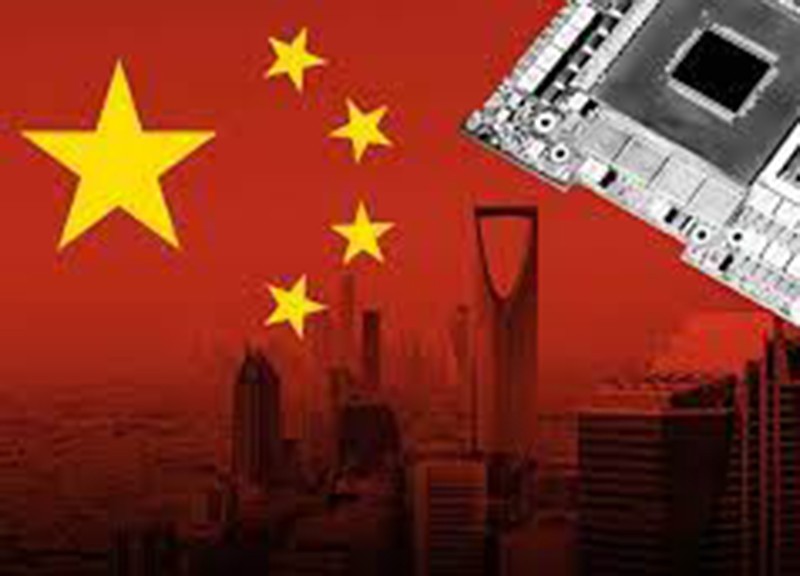
Fears grow at Gulf kingdom’s top university that ties to Chinese researchers risk upsetting US government
Simeon Kerr and Samer Al-Atrush in Dubai, Qianer Liu in Hong Kong, Madhumita – Financial Times
Saudi-Chinese collaboration in artificial intelligence has stirred fears within the Gulf kingdom’s premier academic institution that the ties could jeopardise the university’s access to US-made chips needed to power the new technology.
Professor Jinchao Xu, an American-Chinese mathematician at Saudi Arabia’s King Abdullah University of Science and Technology (Kaust), has launched AceGPT, an Arabic-focused large language model, in collaboration with the Chinese University of Hong Kong, Shenzhen (CUHK-SZ), and the Shenzhen Research Institute of Big Data.
The move is part of Saudi Arabia’s efforts to lead the regional development of AI technology, building large supercomputers and rolling out LLMs, the technology that underpins generative AI systems such as chatbots. Along with the United Arab Emirates, the Gulf powerhouse is seeking to compete with AI companies and create bespoke models for Arabic speakers.
Western officials have long expressed concerns about growing technology transfer between their traditional allies in the Gulf and China.
The US has expanded export licence requirements for graphics processing units made by Nvidia and AMD, preventing Chinese entities from accessing the cutting-edge chips that are vital in building generative AI models. But the Biden administration has stopped short of blocking exports to the Middle East.
However, people at Kaust seeking to obtain these chips nonetheless believe that limiting Chinese co-operation is vital to secure delivery.
“Many people involved have raised their concerns to leadership about the Chinese relationships jeopardising the supercomputer,” said one of the people aware of the matter. “They don’t want to upset the US government.”
AI has become one of the regional battlegrounds of China-US competition in the Gulf, where Riyadh and Abu Dhabi are determined to build on flourishing trade relations to include technology transfer while also sustaining ties with Washington, their main security partner.
Abu Dhabi has launched a new version of its Falcon model, claimed to be more than twice as powerful as Meta’s Llama 2, previously seen as the most sophisticated “open source” model. G42, a company controlled by the UAE’s national security adviser Sheikh Tahnoon bin Zayed al-Nahyan, which has co-operated with China on vaccines and laboratory testing, has also released an Arabic-language LLM.
US officials are expanding efforts to lure the Gulf States away from China, including backing a rail and shipping corridor linking India and Europe through the Middle East.
The latest Gulf move into AI comes as Kaust president Tony Chan builds on his outreach to China, including signing deals with Shenzhen universities to share research capabilities and talent exchange. He co-wrote an essay last month in Foreign Policy titled “America can’t stop China’s rise. And it should stop trying.”
Kaust has said the Saudi-China exchange is “thriving”, as evidenced by the growing demographic of Chinese academics at the university, including 20 per cent of students, 34 per cent of postdoctoral researchers and 9 per cent of faculty members.
A member of Kaust staff said Chinese universities offered cheaper interns and students who could handle rote work, including testing the GPUs and sifting data.
The AI initiative at Kaust, led by German computer scientist Jurgen Schmidhuber, is developing a more powerful supercomputer, Shaheen III that aims to deliver 20 times more computing power than that of its existing system.
In response to questions about the new LLM, Kaust described the AceGPT project as “an individual research project by one of our professors” that “had not been run on Kaust supercomputer Shaheen II”. The chatbot is trained in Arabic, Chinese and English.
Kaust said that it “has relations with many countries worldwide,” and that its “investments in GPUs are based on the needs of its own academic community to deliver projects of significance to the Kingdom it serves.”
“Where research collaborations are concerned, our supercomputers and other computing infrastructure cannot be accessed without strict, internationally compliant controls,” it added.
The university said it had contracted Hewlett Packard Enterprise to deliver the Shaheen III system, for which the US firm chose Nvidia chips. Kaust was not buying the chips directly from Nvidia, the university added. Kaust has yet to receive the order.
HPE said it was monitoring export controls and remained “committed to serving our customers around the world in line with US government guidelines”.
Kaust also said it complied with US export control regulations and had a monitoring framework to meet the safeguarding regulations to be able to operate Shaheen III.
“Physical and system software access to Shaheen III is limited to the Kaust Core Labs system administrator and Hewlett Packard Enterprise teams,” it said.














